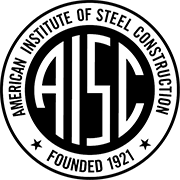AISC
Stability of Cold-Formed Steel Compression Members under Thermal Gradients
This paper explores the elastic stability of concentrically loaded cold-formed steel (CFS) members subjected to non-uniform temperature distributions. The main objectives of this study are to show the evolution of the buckling loads and modes due to fire action, and explore the finite strip method as an alternative technique for evaluating the stability of CFS members subjected to thermal load. During a fire, elevated temperatures modify the thermal and mechanical properties of CFS, altering the material strength and member stiffness, so that the load-carrying capacity is reduced. Since fire causes non-uniform and time-Varying thermal loads, temperature gradients are developed on the structure and its members, leading to unsymmetric member response even when the applied load is uniformly distributed and initial geometric imperfections are negligible. In addition, the instabilities of CFS members are associated with the temperature distributions that such members experience. For instance, a column dominated by local buckling at ambient temperature could present a local-distortional buckling interaction under a fire generated temperature field. Computational analyses are performed to determine the temperature distribution on the structure over time, considering a standard fire curve as the input thermal condition. Sequentially coupled mechanical analyses are used to investigate the member stability associated with thermal gradients, using the finite element method. Approximate results, obtained from the more efficient finite strip method, are compared against the finite element solutions.
- Date: 4/16/2013 - 4/20/2013
Authors
Batista Abreu, J.C. and B.W. Schafer; Johns Hopkins University; Baltimore, MD
